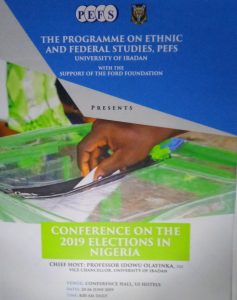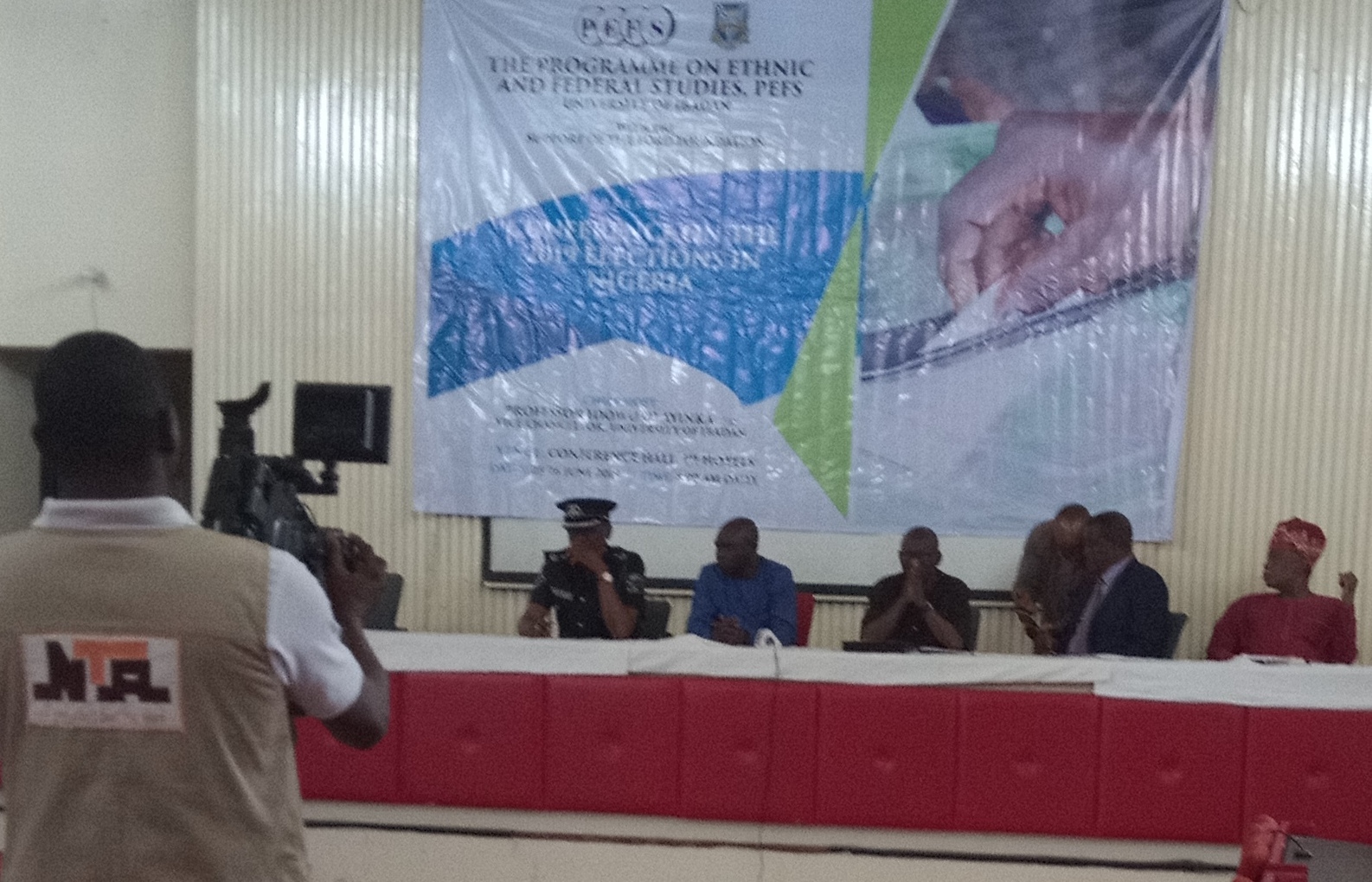The ancient South-western Nigerian city of Ibadan woke up today to an explosive conversation as top flight intellectuals, the Inspector-General of Police, the Independent National Electoral Commission, (INEC) and other stakeholders in free and credible elections took the 2019 General Elections in Nigeria to the slaughter slab. The posers range from whether Nigeria doesn’t have too many political parties and that acting as a constraint on conduct of credible elections; how guilty is INEC outside the Nigerian political economy; what lessons are there to be learnt from the May 2019 elections in South Africa; would political scientists in Nigeria be right to refer to what we have as democracy when the politicians themselves call it a ‘do or die’ affair?; is Nigeria a federation, a republic or not? To what extent can we blame politicians when competition for Deanship election in some universities involves ritual practices by some contestants?; how come INEC has no history of punishing any actors in the electoral process even in the face of flagrant violations?; is it sustainable to single out the politicians even when, but for divine intervention, Nigerians would have queued to vote for General Sani Abacha as the sole candidate of five political parties in 1998?
 These are some of the questions that emerged as the audience engaged one presentation after another and there are many more, including those who said Nigeria is merely going round and round in denial instead of reckoning that it is not a nation but only a country. Or the position that there are no political parties in Nigeria but just platforms ferrying people to political offices. And the contrary position that there are parties in so far as they are involved in struggle for power. A related but earlier contention is the notion that the problem in Nigeria is the lack of institutional capacity to rein in the actors in favour of responsible use of discretionary powers and that otherwise, most of the problems of credible elections can be reduced to the barest minimum. The conference also heard how laws exist already which empowers INEC to deregister parties and it shouldn’t be grumbling about the question of number of parties if it were not trembling before its own powers.
These are some of the questions that emerged as the audience engaged one presentation after another and there are many more, including those who said Nigeria is merely going round and round in denial instead of reckoning that it is not a nation but only a country. Or the position that there are no political parties in Nigeria but just platforms ferrying people to political offices. And the contrary position that there are parties in so far as they are involved in struggle for power. A related but earlier contention is the notion that the problem in Nigeria is the lack of institutional capacity to rein in the actors in favour of responsible use of discretionary powers and that otherwise, most of the problems of credible elections can be reduced to the barest minimum. The conference also heard how laws exist already which empowers INEC to deregister parties and it shouldn’t be grumbling about the question of number of parties if it were not trembling before its own powers.
But there are also interesting proposals put on the table. The most profound proposal must be Prof Adele Jinadu whose Keynote Address canvassed it. He has to be allowed to speak in his own words: The inexorable logic of ‘the perpetual crises of democracy’ referred to earlier in this paper and their contradictions demands the imperative of forging a mass movement straddling ethnic barriers, in state and society; with members serving as virtual neighborhood night watch guards to reinvent electoral politics and protect electoral mandate. The countervailing role of the middle class and particularly intellectuals and professional groups is central to forging such a coalition”. In this proposal, Jinadu has rehabilitated radical politics from orthodoxy by emphasizing coalition rather than class essentialism in an age of incredible fragmentation. It is more so that he adds that “the starting point for the work of the coalition is to mobilise public opinion in support of the unfinished electoral reform recommended by the Election Reform Committee (of 2008)”.
The paper which looked at the South African experience came with two shockers. One is the contention that ANC dominance in South Africa in spite of Proportional Representation design has nothing to do with race or ethnicity but the paradigm of the calculus of waiver at work. In other words, black privilege loot the country but still win elections because majority of black voters pursue bigger issues of interest, giving it to politicians that offer waivers on those existential issues: electricity, water and so on.

South African president, Cyril Ramaphosa
The second and even more interesting point from Prof Harry Garuba, the immediate past Dean of the College of Humanities at the University of Cape Town is the rating of South Africa as a perfect example of the biometric state, far ahead of some industrialized Western countries. Biometrical practices define biopolitics or the governing of the population through discipline. That is discipline in the sense of organizing citizens for ‘good behaviour’. Discipline is thus the specific ways of making the population survey themselves through schooling, for instance; the asylum or prison system to reform convicts instead of killing them off or through professional grooming as in the military and similar occupational induction. Each of these practices have panoptic or self-monitoring effect on the mentality of the citizens in terms of social conformity. Philosophers of biopolitics contrasts it with sovereign exercise of power which is regarded as management of power through spectacular violence such as shooting people to death or the practice of castration or similar coercive crudity in taking life that reigned before the modern epoch.
It is on this basis that the philosophers of biopolitics argue a pastoral dimension of governance or of power and which pastoral dimension explains the fervency with which Western governments value the life of individual citizens. Grab even a certified American criminal anywhere in the world today and hear how loud the American State will grumble. It applies to the entire Western world. The same applies to the transnational advocacy against death sentences by INGOs such as Amnesty. It is the pastoral aspect of power they are demonstrating if you ask students of biopolitics.
Whether biopolitics as a model of exercising power is workable in a non-industrial society was the puzzle. With Garuba’s information, it can be inferred to be workable except that underlining biopolitics is neoliberalism. Contrary to the more popular understanding of neoliberalism as the free market business model, Michel Foucault, for instance, would say it is the framework by which biopolitics works as a governmentality – techniques, tactics, rationale, strategies by which government and governance produces its own truth. That is made possible by biometrics such that the individual cannot deceive the law or take him or herself outside the law.
As Garuba put it, biometric state means you cannot be 20 years today but turn up to say you are 14 years tomorrow because the state has every details about you. That is so because, in South Africa, every child gets a National Identity No. at birth and every moment of his or life is known to the state. It shows how far Nigeria has to go to reify itself as a modern state because most politicians have no idea of the biometric state.
Instructively, Prof Garuba started by reflecting on the possibility of credible elections in an un-numerated in which the population size is a guess work, not to talk of what each person does for a living. That’s a big poser for scholars of good management of elections in Nigeria.
Could this have anything to do with why even as no voices were silenced as nearly everyone who wanted to speak was given the floor, INEC has so far made the best use of the conference to reply its critics in what can be regarded as the law of unintended effect at play. Although the trend in favour of INEC could change, it managed to steal the show on Day One from likely as well as unlikely quarters.

INEC Chairman, Prof Mahmood Yakubu
The first sign of something good for INEC came in the Keynote Address by Prof Adele Jinadu, a portion of which dismissed the heroism of going to the television to declare INEC as incompetent because the situation on the ground might not support such a conclusion. He did not set out to defend INEC but it was a contention that a beleaguered INEC is bound to interpret as the voice of moderation in the attacks on it in the aftermath of some of the incomprehensible features of the 2019 elections. This is more so that apart from Jinadu’s stature as an intellectual of politics, he has been a National Electoral Commissioner in the past and is currently involved in election management in the Nigerian Election Working Group.
INEC’s fortunes soared further when the Oyo State Resident Commissioner, Barrister Mutiu Agboke, took the floor. He stood in for Prof Yakubu Mahmood, INEC Chairman whose presence at the Ibadan conference reportedly took the back seat only late the previous night. But the dramatic deployment of the rhetorical device by the Resident Electoral Commissioner, (REC) more than compensated for the absence of the INEC boss. Although many contradictions were pointed out in the REC’s presentation by his interrogators from the audience, he got away with a loud applause at the end of his presentation.
Part of the reasons for that might not be unconnected with the title of his presentation in which the key words were ‘Successes, Challenges and the Future’. It could not have been for nothing that a word such as ‘failure’ was not a keyword in the title. For successes, he mentioned so many, among them the fact that registration of voters became a continuous exercise since April 2017 till a week to the 2019 elections; the appointment of Registration Area Technicians in case of Smart Card Reader breakdown; ceaseless engagement with stakeholders; activation of Registration Area Centres and what he called voter education publicity.
For the challenges, he listed late arrival of the security team such that voting could not start in many units even when all else is set; too many cases against INEC, about 200 of them on the eve of the 2019 election and many of such cases the direct product of shenanigan by political parties such as those that would not conduct primaries; threat to REC by powerful individuals who insist on things going according to their wish and too many political parties, including those that have won no seats anywhere at all.
His argument is for intellectuals to start talking loudly, pushing a case for amendment of the Electoral Act to allow for variation in the number of political parties; to make the conduct of elections more electronic and less paper based; to open up the space in such a manner that reduces temptation to impunity by politicians. Part two of this report will bring – in the papers or aspects that have not been mentioned here!




























